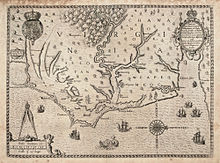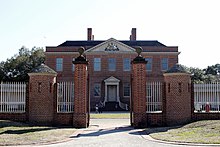North Carolina
North Carolina (/ˌkærəˈlaɪnə/ ⓘ KARR-ə-LIE-nə) is a state in the Southeastern region of the United States. It is bordered by Virginia to the north, the Atlantic Ocean to the east, South Carolina to the south, Georgia to the southwest, and Tennessee to the west. The state is the 28th-largest and 9th-most populous of the United States. Along with South Carolina, it makes up the Carolinas region of the East Coast. At the 2020 census, the state had a population of 10,439,388.[7] Raleigh is the state's capital and Charlotte is its most populous city. The Charlotte metropolitan area, with an estimated population of 2,805,115 in 2023,[8] is the most populous metropolitan area in North Carolina, the 22nd-most populous in the United States, and the largest banking center in the nation after New York City.[9] The Research Triangle, with an estimated population of 2,368,947 in 2023, is the second-most populous combined metropolitan area in the state, 31st-most populous in the United States,[8] and is home to the largest research park in the United States, Research Triangle Park.
This article is about the U.S. state. For the former British colony, see Province of North Carolina. For other uses, see North Carolina (disambiguation).
North Carolina
November 21, 1789 (12th)
Roy Cooper (D)
Thom Tillis (R)
Ted Budd (R)
- 7 Republicans
- 7 Democrats
53,819.16 sq mi (139,391.0 km2)
48,617.91 sq mi (125,919.8 km2)
5,201.25 sq mi (13,471.2 km2) 9.66%
500[2] mi (804 km)
184 mi (296 km)
700 ft (210 m)
6,684 ft (2,037 m)
0 ft (0 m)
10,439,388
214.72/sq mi (82.90/km2)
$52,752[4]
North Carolinian (official);
Tarheel (colloquial)
English[5]
As of 2010[6]
- English 90.70%
- Spanish 6.93%
- Other 2.73%
N.C.
33° 50′ N to 36° 35′ N
75° 28′ W to 84° 19′ W
Esse quam videri
("To be, rather than to seem")[a]
First in Flight, First in Freedom (unofficial)
Scuppernong grape and sweet potato
Megalodon teeth
Marbled salamander (salamander)
The earliest evidence of human occupation in North Carolina dates back 10,000 years, found at the Hardaway Site. North Carolina was inhabited by Carolina Algonquian, Iroquoian, and Siouan speaking tribes of Native Americans prior to the arrival of Europeans. King Charles II granted eight lord proprietors a colony they named Carolina after the king and which was established in 1670 with the first permanent settlement at Charles Town (Charleston). Because of the difficulty of governing the entire colony from Charles Town, the colony was eventually divided and North Carolina was established as a royal colony in 1729 and was one of the Thirteen Colonies. The Halifax Resolves resolution adopted by North Carolina on April 12, 1776, was the first formal call for independence from Great Britain among the American Colonies during the American Revolution.[10]
On November 21, 1789, North Carolina became the 12th state to ratify the United States Constitution. In the run-up to the American Civil War, North Carolina declared its secession from the Union on May 20, 1861, becoming the tenth of eleven states to join the Confederate States of America. Following the Civil War, the state was restored to the Union on July 4, 1868.[11] On December 17, 1903, Orville and Wilbur Wright successfully piloted the world's first controlled, sustained flight of a powered, heavier-than-air aircraft at Kitty Hawk in North Carolina's Outer Banks. North Carolina often uses the slogan "First in Flight" on state license plates to commemorate this achievement, alongside a newer alternative design bearing the slogan "First in Freedom" in reference to the Mecklenburg Declaration and Halifax Resolves.
North Carolina is defined by a wide range of elevations and landscapes. From west to east, North Carolina's elevation descends from the Appalachian Mountains to the Piedmont and Atlantic coastal plain. North Carolina's Mount Mitchell at 6,684 ft (2,037 m) is the highest point in North America east of the Mississippi River.[12] Most of the state falls in the humid subtropical climate zone; however, the western, mountainous part of the state has a subtropical highland climate.[13]
Health[edit]
The residents of North Carolina have a lower life expectancy than the U.S. national average of life expectancy. According to the Institute for Health Metrics and Evaluation, in 2014, males in North Carolina lived an average of 75.4 years compared to the national average of 76.7 years. Females in North Carolina lived an average of 80.2 years compared to the national average of 81.5 years. Male life expectancy in North Carolina between 1980 and 2014 increased by an average of 6.9 years, slightly higher than the male national average of a 6.7-year increase. Life expectancy for females in North Carolina between 1980 and 2014 increased by 3.2 years, lower than the female national average of a 3.9-year increase.[211]
Using 2017–2019 data, the Robert Wood Johnson Foundation calculated that life expectancy for North Carolina counties ranged from 71.4 years for Swain County to 82.3 years for Orange County. Life expectancy for the state was 78.1 years.[212] The Foundation estimated that life expectancy for the United States as a whole in 2021 was 79.2 years.[213]
North Carolina is home to four major league sports franchises: the Carolina Panthers of the National Football League, the Charlotte Hornets of the National Basketball Association, and Charlotte FC of Major League Soccer are based in Charlotte, while the Raleigh-based Carolina Hurricanes play in the National Hockey League. The Panthers and Hurricanes are the only two major professional sports teams that have the same geographical designation while playing in different metropolitan areas. The Hurricanes are the only major professional team from North Carolina to have won a league championship, having captured the Stanley Cup in 2006. North Carolina is also home to two other top-level professional teams — the Charlotte Hounds of Major League Lacrosse and the North Carolina Courage of the National Women's Soccer League.
While North Carolina has no Major League Baseball team, it does have numerous Minor League Baseball teams, with the highest level of play coming from the Triple-A Charlotte Knights and Durham Bulls. Additionally, North Carolina has minor league teams in other team sports including soccer and ice hockey, most notably North Carolina FC and the Charlotte Checkers, both of which play in the second tier of their respective sports.
In addition to professional team sports, North Carolina has a strong affiliation with NASCAR and stock-car racing, with Charlotte Motor Speedway in Concord hosting two Cup Series races every year. Charlotte also hosts the NASCAR Hall of Fame, while Concord is the home of several top-flight racing teams, including Hendrick Motorsports, Roush Fenway Racing, GMS Racing, Stewart-Haas Racing, and Chip Ganassi Racing. Numerous other tracks around North Carolina host races from low-tier NASCAR circuits as well.
Golf is a popular summertime leisure activity, and North Carolina has hosted several important professional golf tournaments. Pinehurst Resort in Pinehurst has hosted a PGA Championship, Ryder Cup, two U.S. Opens, and one U.S. Women's Open. The Wells Fargo Championship is a regular stop on the PGA Tour and is held at Quail Hollow Club in Charlotte, and Quail Hollow has also played host to the PGA Championship. The Wyndham Championship is played annually in Greensboro at Sedgefield Country Club.
College sports are also popular in North Carolina, with 18 schools competing at the Division I level. The Atlantic Coast Conference (ACC) is headquartered in Greensboro, and both the ACC Football Championship Game (Charlotte) and the ACC men's basketball tournament (Greensboro) were most recently held in North Carolina. Additionally, the city of Charlotte is home to the National Junior College Athletics Association's (NJCAA) headquarters.[243] College basketball is very popular in North Carolina, buoyed by the Tobacco Road rivalries between ACC members North Carolina, Duke, North Carolina State, and Wake Forest. The ACC Championship Game and the Duke's Mayo Bowl are held annually in Charlotte's Bank of America Stadium, featuring teams from the ACC and the Southeastern Conference. Additionally, the state has hosted the NCAA Men's Basketball Final Four on two occasions, in Greensboro in 1974 and in Charlotte in 1994.





